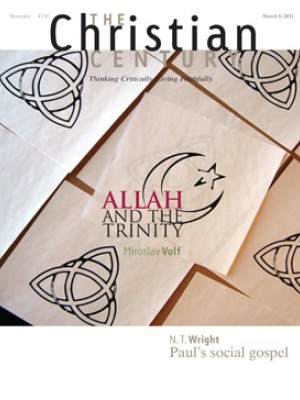Christian Ethics in a Technological Age, by Brian Brock
Christians have often used technology—from electric guitars to PowerPoint presentations to blogs—in the service of witnessing to their faith. The sequence of technological advance seems to go something like this: 1) a new technology is introduced; 2) it takes off in the "secular" world; 3) eager pastors and churches keen to be relevant seize upon it in whatever way possible.
But do we really need to keep up with the next new thing to remain relevant, even as new things are developed and sold every week or so? I used to think so—until the array of new technologies began to leave me feeling dizzy and hurried.
Dizzy and hurried aren't words the Christian life should engender. Yet technology exists and has done some good. How should Christians respond?
Brian Brock's response is that Christians need to offer a different, more reflective kind of witness for our technological age. He is not a Luddite. He doesn't think that mainline Christians should pursue an Amish-style revolution against technology. He differentiates between technology and a technological age.
Read our latest issue or browse back issues.
In the present technological age, he says, humans have a different kind of relationship to technology than they had in the past. Technology is now "a constitutive aspect of modern humanity." In other words, in the boardroom, in church meetings, at the doctor's office, at sporting events, in movie theaters and even during such everyday activities as eating, we presume the use of technology—and that the future holds even more technology.
What happens when technology is a presumption, an entire way of looking at the world—and people don't realize that they are seeing the world differently than their forebears did? Drawing on philosophers like Martin Heidegger and Michel Foucault, Brock suggests that the modern vision exchanges the world's order of creation for an ordering of our own making. We seek to exert control over what we perceive as the world's backwardness and chaos as we envision a new world brought about by technological development.
The result of this way of thinking is a change in our relationships. Rather than seeing each other as neighbor or as creature, we focus on people as instruments for creating or clearing the way for that new technological world. A pointed example of Brock's is the way warfare has changed from face-to-face combat to the use of automated weapons and high-altitude bombing, which makes the enemy less persons to encounter and more an unnamed, faceless mass.
From Brock's point of view, the loss of the ability to see each other as neighbor is especially damning. How then are Christians to think about ethics in a technological age? Brock wants us to return to ancient Christian habits. If our technological age sees limitless possibilities for new worlds, Brock wants Christians to recall that we are limited beings. Our faith is anchored in "Jesus Christ and him crucified." Most of all, he wants us to remember our worship, through which we genuinely communicate with each other (most notably in the Lord's Supper), and which reminds us to see each other not as formless masses to be manipulated but as creatures of God.
Brock raises some questions (but gives few answers) about technological practices such as blogging and industrial farming. Hopefully his questions will serve as starting points for broader conversation about ways to faithfully blog and eat as a witness to Jesus Christ.
Brock is right to push Christians to recover practices like prayer and silence in the face of a frenetic technological society. At the most basic level, the meaning of worship is too often obscured by the introduction of the latest tech gadgets, and we end up simply perpetuating a worldview that is antithetical to Christ.
Yet my initial question remains: Technology exists, so how can Christians use it wisely to witness to Christ? That is to say, if Brock is right that we truly cannot get outside our technological age because it is constitutive of us, what hope do we have that even ancient habits can do the kind of work we want?







